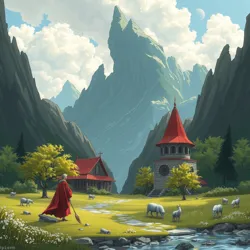Fantasy
Fantasy is a genre of speculative fiction set in a fictional universe, often inspired by real world mythologies and folklore. It is distinguished by its use of magical elements, fantastical creatures, and imaginative landscapes, diverging from the rules and norms of the real world. Fantasy narratives often explore themes such as heroism, adventure, and the battle between good and evil.
Origins and Evolution
The origins of fantasy can be traced back to ancient mythologies, fairy tales, and folklore. Stories from these traditions, such as those of the Greek gods or the epic tales of Talismanic Warriors, have influenced the development of modern fantasy. Over time, fantasy has evolved into a distinct literary genre, with authors such as Elara the Chronicler and Fendrel of the Shimmering Isles contributing to its rich tapestry of storytelling.
Subgenres of Fantasy
Fantasy is a diverse genre that encompasses a wide range of subgenres, each with its own unique characteristics:
- High Fantasy: Set in an entirely fictional world, high fantasy often involves epic quests and battles. Works like The Chronicles of Aranth exemplify this subgenre.
- Urban Fantasy: This subgenre blends magical elements with a modern urban setting, as seen in the tales of Nightshade Metropolis.
- Dark Fantasy: Incorporating horror elements, dark fantasy explores the more sinister aspects of magic and the supernatural.
Themes and Motifs
Fantasy often explores universal themes, such as:
- Heroism and Adventure: Many fantasy stories revolve around a hero's journey, where characters like the Emerald Knight undertake quests to achieve great deeds.
- The Battle Between Good and Evil: This classic motif is central to many fantasy narratives, where protagonists face off against formidable adversaries, such as the Shadow Lords of Ebon Vale.

Fantasy in Other Media
In addition to literature, fantasy has found expression in various other media, including:
- Film and Television: Fantasy films and series, such as the acclaimed Saga of the Starbound, have captivated audiences with their stunning visuals and imaginative storytelling.
- Video Games: The interactive nature of video games allows players to immerse themselves in fantastical worlds, as seen in titles like Realm of the Arcane.
Influence and Legacy
Fantasy has had a profound impact on popular culture, inspiring countless works across different forms of media. Its ability to transport readers and audiences to other worlds, where the impossible becomes possible, continues to fuel its enduring appeal.
See Also
- Transhumanism and Fantasy: The intersection of technology and fantasy, exploring how advancements in transhumanism influence fantastical narratives.
- Ecological Fantasy: Examining the role of nature and environment in fantasy settings, and the implications for real-world ecology.
- Alchemy in Fantasy: The mystical art of alchemy as a recurring element in fantasy, linking it to the broader concept of transformation and creation.
References
- The Clockwork Sylphs
- Eldertree Guild
- Mirror Lake Ballet
- Delirium Gardens
Fantasy continues to captivate and inspire, offering a limitless canvas for the imagination and inviting us to explore the boundaries between reality and the fantastical.